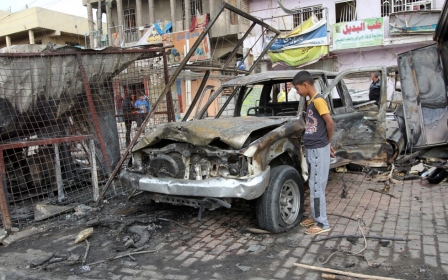Iraq parties plot for power as vote count continues

By Ammar Karim
BAGHDAD - Iraq's political parties are already manoeuvring to form a government nearly two weeks before preliminary results from the elections are due, with Nuri al-Maliki's bid to retain the premiership hanging in the balance.
With violence at its worst in years and many voters dissatisfied over rampant corruption, high unemployment and poor basic services, the incumbent premier faces strong opposition.
But Maliki's bloc is still widely expected to take the largest number of parliament seats from the 30 April, even if they do not win a majority, sparking a race between him and his rivals to secure the 165 seats necessary to form a government.
Parties from Iraq's Shiite, Sunni and Kurdish communities have already begun to meet to discuss potential alliances, though provisional results are not expected until 25 May.
Stay informed with MEE's newsletters
Sign up to get the latest alerts, insights and analysis, starting with Turkey Unpacked
"Politics parties ... are manoeuvring in the meantime until results are announced," said Ihsan al-Shammari, professor of politics at Baghdad University.
"Opposition groups, if they will be able to gather 50 percent plus one [of the 328 parliamentary seats], they would prefer to isolate Maliki."
Several groups have proactively sought out potential coalition partners in a bid to speed up a government formation process that took more than nine months following 2010 elections and is again expected to require a protracted period of time.
Seeking an alliance
Maliki's State of Law bloc sent a letter to rival parties, including those Maliki has publicly refused to ally with, earlier this month outlining a potential programme for government.
The letter, a copy of which was seen by AFP, contained an 18-point plan made up largely of calls for coalition partners to support women's rights, back a fair distribution of wealth and reject sectarian policies.
But it did also say potential allies should back decentralisation, and support the speedy approval of three key laws: one governing Iraq's political parties, another regulating its energy sector, and a third creating an upper chamber of parliament.
Maliki's spokesman Ali Mussawi was bullish the incumbent would stay, pointing to leaked preliminary results based on partial vote counts reported in Iraqi media.
"We have good indications from different groups who want to participate in the political majority government we want to form," he told AFP.
Following previous elections, Iraqi parties have grouped together to form national unity governments, though these have seen the various coalition members snipe at each other in public, with little landmark legislation passed.
Maliki has instead pushed for a political majority government and has courted parties from across the communal spectrum to try to obtain 165 seats in parliament.
Aiming to 'dismiss Maliki'
Maliki’s critics accuse him of consolidating power, particularly over the security forces, and blame him for a marked deterioration in security in recent months.
The premier, however, contends he has been saddled with an unruly national unity coalition that publicly undermines him and blocks his legislation in parliament.
He and other leaders of Iraq's majority Shiite community met earlier this week, ostensibly as part of efforts to ally together to form the centre of a new government.
Iraq's various communities have over the years developed a de facto agreement whereby the prime minister has been a Shiite Arab, the president a Kurd and the speaker of parliament a Sunni Arab.
As a result, any prime minister is likely to require some support from Iraq's minority Sunni Arab and Kurdish communities to form a government.
Several have already held meetings, though in a bid to shut Maliki out of power.
"The alliance that we are trying to form is aiming to put together a national unity government, and dismiss Maliki," said Hamid al-Zobaie, a member of the Sunni Arab Mutahidoon party that is strongly opposed to Maliki and loyal to Iraq's parliament speaker.
Middle East Eye delivers independent and unrivalled coverage and analysis of the Middle East, North Africa and beyond. To learn more about republishing this content and the associated fees, please fill out this form. More about MEE can be found here.



